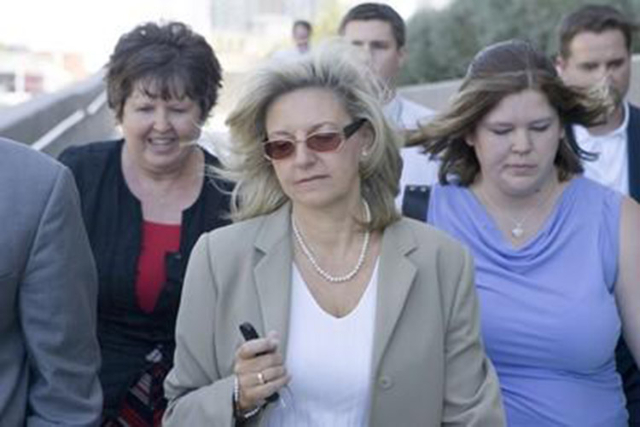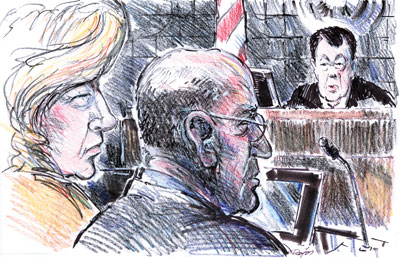Kenny gets 2 1/2 years
Former Clark County Commissioner Erin Kenny's own attorney complained she had become the most vilified public official in Clark County history, but a federal judge on Wednesday simply called her a liar and sentenced her to 30 months in prison.
"I continue to wonder whether we've only seen the tip of the iceberg," U.S. District Judge Kent Dawson said, suggesting that Kenny was not completely honest about how many times she had sold her vote and to whom. "However, I can't speculate."
Add Dawson to the list of skeptics who question whether Kenny was truthful and forthright when she testified about her memory loss and the corrupt relationships she established while in office.
He sentenced Kenny to 30 months in federal prison, six months longer than the term recommended by Assistant U.S. Attorney Daniel Schiess. Kenny, who must surrender to prison by Sept. 18, also was fined $129,741.47. She had to forfeit $70,258.53 on top of that, bringing the total to an even $200,000.
Prior to levying the sentence, Dawson said he was disturbed by the admitted felon's testimony in June that she worked for developer Jim Rhodes and was paid $16,800 a month to serve as his government services consultant.
Kenny said Wednesday that she no longer works for Rhodes.
Dawson also questioned the validity of Kenny's contention that a bout with vertigo seven years ago led to significant memory loss. When Kenny testified against former colleagues Dario Herrera and Mary Kincaid-Chauncey, and most recently real estate consultant Donald Davidson, her memory was foggy about some events yet crystal clear on others.
"The vertigo, there may be an element of truth to that," Dawson told Kenny. "But to try to keep track of the lies and deception could make anyone's head spin."
Kenny addressed the judge and acknowledged she broke the law. But she did not apologize to the thousands of voters who each Election Day marked her name, trusting that Kenny would represent their best interests. In fact, Kenny apologized to no one.
"I'm not here today to make any excuses because there are none," Kenny said in a soft voice. "I'm here to see this through."
Kenny's brief comments did not sit well with her constituents who battled her during her tenure on the board.
Community activist Lisa Mayo-DeRiso said Kenny's failure to apologize to the citizens she so blatantly betrayed was "shocking." Still, Mayo-DeRiso was pleased with the judge's decision to hand out a harsher punishment than prosecutors requested.
"The sentence is fine," Mayo-DeRiso said. "It's 29.99 more months than I would ever want to spend in prison."
Federal prisoners can be released to a halfway house six months before their scheduled release dates, so Kenny could spend 24 months in prison and then serve the rest of her sentence in a halfway house.
Kenny entered a plea agreement with the federal government on July 10, 2003. She later pleaded guilty to conspiracy and honest services fraud. Her plea deal capped her potential sentence at five years, but because she provided assistance to the government, she fell into a range of between 24 months and 30 months. The judge, however, could have handed down a sentence outside of the recommended range.
The charges against the 46-year-old mother of five were related to pocketing bribe money from former strip club owner Michael Galardi. But during interviews with government officials, Kenny also revealed she accepted $200,000 from Davidson in exchange for her help in pushing through a controversial CVS Pharmacy at Buffalo Drive and Desert Inn Road. She said Davidson also delivered $3,000 a month to her for nearly three years after she led the charge for a zoning change for a Spring Valley casino.
"It's been a long road," Frank Cremen, Kenny's attorney, said of the four years that have passed since Kenny's signing of her agreement to plead guilty.
Cremen said Kenny intended to cooperate with federal agents since May 14, 2003, the day they visited the former commissioner and informed her she was the target of a political corruption investigation.
"She told me she did something wrong," Cremen said. "She did not want to fight it."
Cremen blamed the media, particularly the Review-Journal, for bashing Kenny and casting her as a rat for turning on her former colleagues.
"The R-J has made this woman the most vilified and hated woman in Clark County," Cremen said.
He argued that cooperation with the government should be encouraged, noting that his client gave the government details of crimes it knew nothing about.
Cremen unsuccessfully argued for a sentence of less than 24 months, the lowest level of the sentencing range Kenny faced after cooperating. He also asked that Kenny be allowed to split her sentence between prison and a halfway house.
Schiess agreed that Kenny offered her assistance immediately. Despite an individual with "political influence" attempting to dissuade Kenny from cooperating with the government the day she was notified of the investigation, Kenny agreed to speak with federal agents, Schiess said. Schiess did not say who the politically influential person was or exactly what that person said.
During Davidson's trial, defense attorney Dominic Gentile, said Kenny made several phone calls the day of the FBI agents' initial visit. He said she called Rhodes, lawyer Jay Brown, lobbyist Mark Brown and her longtime friend, lobbyist John Pappageorge.
Schiess told Dawson that Kenny was helpful in rebutting the defense strategies of Kincaid-Chauncey and Herrera, each of whom were ultimately convicted of taking bribe money from Galardi. Kincaid-Chauncey and Herrera claimed that Galardi's bagman, Lance Malone, stole the piles of cash supplied by Galardi.
Kenny told jurors that Malone delivered the payoffs to her consistently. She also explained that commissioners used veiled terms in discussing their corrupt acts on the phone.
Schiess said that without Kenny, the government would not have been aware of the illegal payments from Davidson. The jury in Davidson's trial this month deadlocked on 18 counts involving Kenny, the government's star witness. But Schiess did not hold the deadlock against Kenny.
"There were no tape recordings of those bribes," Schiess said. "She came forward and disclosed that information."
Kenny's sentence is the same as the term imposed on Galardi, who also pleaded guilty and assisted the government with its investigation. Kincaid-Chauncey also received 30 months. U.S. District Judge Larry Hicks said he was lenient with her because of her age, 68, and the charitable work she accomplished throughout her life. Malone received a six-year sentence for acting as a leader in the scheme.
Kincaid-Chauncey and Herrera, who was sent to prison for 50 months, would have received shorter sentences had Hicks not believed they lied on the witness stand, Hicks said.
Kenny and Galardi, whose plea agreements said their deal with the government could be repealed if they did not testify truthfully, contradicted each other on at least one occasion. Kenny told jurors she did not have a sexual relationship with Galardi; Galardi said Kenny performed oral sex on him.
Her memory loss was severely criticized by defense attorneys and foes within the community. She raised eyebrows when she remembered details such as the average number of vehicles that traveled on Desert Inn Road each day in 2001, but not a contentious vote at the end of her term in 2002.
Davidson's jurors said Kenny's inconsistent recollection led them to believe very little that she had to say.
"If Erin Kenny walked into a room at noon and said the sun is shining, I would have to go look out the window to see for sure," said juror Ron Bowling. "It's pathetic."
Kenny's charges all stemmed from the Galardi case, but Schiess said Kenny allowed the court to consider the bribes she accepted from Davidson in her sentence and fine.
He said she admitted to taking $70,000 from Galardi, $200,000 plus $3,000 a month for nearly three years from Davidson and $5,000 from Davidson's client, John Hui. In all, Schiess said Kenny pocketed nearly $400,000 in bribe money.
Kenny testified last year that she had not paid taxes on the bribe money. On Wednesday, Cremen said the Internal Revenue Service has assessed all of the former commissioners' ill-gotten income. She is paying back taxes, penalties and interest on the money, Cremen said. The IRS has not filed any criminal charges against Kenny.
After Kenny was sentenced Wednesday, she remained in the courthouse for nearly an hour appearing to wait for the media crowd to disperse. Finally, she darted through the throng of cameras without commenting. The scene was a stark contrast to the days when the commissioner was campaigning and refused to begin her spiel until every media outlet was present.
With Kenny and Davidson soon heading to prison, the question is whether more developers or business people will be snagged by the federal government's probe or whether Kenny's sentencing wraps up one of Southern Nevada's greatest political scandals.
Schiess declined to comment on whether the government is finished with its case.
Bowling said he and his fellow jurors also questioned why more developers and politicians named in the Davidson trial have not been indicted. Some jurors posed the question to Schiess.
"He said he is not at liberty to discuss that, but I sensed he was saying, 'Hey guys, hold on, let's just wait and see.' "
POLITICAL CORRUPTIONGalardi InvestigationNews Archive
AUDIO SLIDESHOW
watch slideshow





























